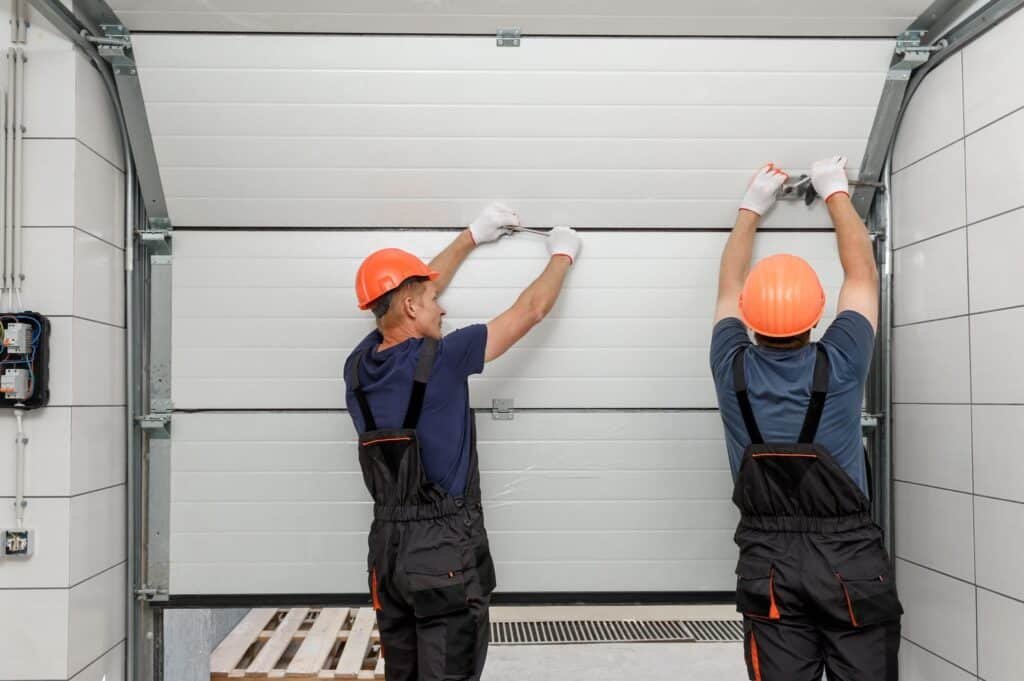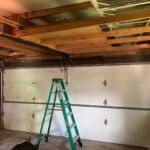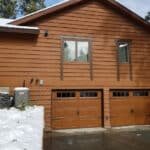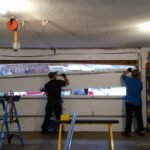Garage doors are a vital component of any home, providing security and protection to your vehicles and other belongings. However, like any other part of your home, garage doors also require regular maintenance and eventually need to be replaced. One of the most common questions homeowners have about their garage door is how often it should be replaced.
The answer to this question depends on several factors, including the quality and type of materials used in the construction of the garage door, as well as how frequently it is used. In this article, we will explore these factors in more detail to help you determine when it’s time for a garage door replacement.
A garage door not only adds to the aesthetic appeal of your home but also ensures the safety and security of your belongings. It is one of those elements of your home that is frequently used but often overlooked when it comes to maintenance and replacement. However, like any other part of your home, your garage door has a finite lifespan. The question is, how often must a garage door be changed?
Factors That Influence Garage Door Lifespan
- Quality and Material: A garage door made from durable materials and superior craftsmanship will naturally have a longer lifespan. For example, solid wood doors, while more expensive, tend to outlast doors made of composite materials.
- Maintenance: Regular maintenance can significantly prolong the life of a garage door. This includes tasks like lubricating the moving parts, tightening loose bolts, and inspecting the door and its hardware regularly for signs of wear and tear.
- Usage: The more often a garage door is used, the quicker it will wear out. If you frequently go in and out of your garage, your door’s components are likely to deteriorate faster.
- Climate: Garage doors exposed to harsh weather conditions are more likely to need replacement sooner. Extreme heat, cold, or humidity can cause the door materials to warp, rust, or decay.
When Should You Replace Your Garage Door?
While the typical lifespan of a garage door ranges between 15 to 30 years, there are signs that indicate it might be time for a replacement:
- Frequent Repairs: If you find yourself frequently calling for garage door repairs, it may be more cost-effective to replace the door entirely.
- Increasing Energy Bills: Older garage doors might not be as energy-efficient as newer models. If you notice a significant increase in your energy bills, it might be due to an old, inefficient garage door.
- Difficulty in Operation: If your garage door is not opening or closing as smoothly as it once did, or if it makes excessive noise during operation, it may be nearing the end of its lifespan.
- Visible Damage: Over time, garage doors can experience significant wear and tear. If you notice visible damage like dents, warping, or rusting, it might be time for a replacement.
- Outdated Appearance: Sometimes, you might want to replace your garage door simply because it’s outdated. A new garage door can significantly improve your home’s curb appeal and value.
The frequency of changing a garage door depends on several factors, such as its quality, material, usage, and the local climate. Regular maintenance can significantly extend the lifespan of a garage door. However, frequent repairs, increased energy bills, difficulty in operation, visible damage, or an outdated appearance can all be signs that it’s time for a replacement. By understanding these factors, you can make an informed decision about when to replace your garage door, ensuring the safety, security, and aesthetic appeal of your home.
Determining Garage Door Lifespan
Garage doors are an essential part of homes, providing security, insulation, and aesthetic value. However, like any other fixture, their lifespan can be influenced by numerous factors such as usage, material, climate, and quality of installation. But how exactly do these factors interplay to determine the lifespan of your garage door? This article will delve into that question, providing you with a comprehensive understanding to guide your future decisions regarding garage door maintenance or replacement.
Usage
Usage is perhaps one of the most direct influencers of a garage door’s lifespan. High-frequency usage increases the wear and tear on the mechanical parts of the garage door system, such as the springs, rollers, and tracks. For instance, a garage door for a family home that is opened and closed multiple times a day is likely to wear out faster than a garage door for a rarely used storage garage. Regular maintenance, including lubricating moving parts and checking for signs of wear, can help offset this effect and prolong the door’s lifespan.
Material
The material of the garage door significantly impacts its durability and longevity. Wood, for example, offers a classic aesthetic and solid durability, but it requires more maintenance and may not fare well in areas with high humidity or heavy rainfall. Steel doors, on the other hand, are robust, low-maintenance, and resist warping and cracking, but they can rust if not properly treated. Aluminum doors are resistant to rust and are generally lighter, making them a good option for extra-wide doors, but they can dent easily.
Climate
Climate plays a critical role in the lifespan of a garage door. In coastal areas, for instance, salt in the air can accelerate corrosion, especially on metal doors. Extreme heat can warp and fade wooden doors, while extreme cold can make certain types of plastic brittle. Therefore, when choosing a garage door, it’s essential to consider your local climate and select a material that can withstand its challenges.
Quality of Installation
Proper installation of a garage door is vital in ensuring its optimal function and longevity. An improperly installed garage door may not open or close correctly, leading to more wear and tear on the door and the opener. Furthermore, poor installation can lead to gaps between the door and the frame, causing insulation issues and increasing energy costs. Therefore, it’s recommended to hire a professional for garage door installation, even though it may come at a higher initial cost. A professional installer will ensure that the door is correctly aligned, balanced and that all components are correctly installed and functioning properly.

Identifying the Signs of Wear and Tear in Your Garage Door
Garage undergoes significant wear and tear due to regular usage and exposure to the elements. Recognizing the signs of wear and tear is essential in maintaining the functionality, safety, and aesthetics of your garage door. This article outlines the common signs of wear and tear to look out for, which will help you decide whether to repair or replace your garage door.
1. Difficulty in Operation
A clear sign of wear and tear is when your garage door no longer operates smoothly. You might notice that the door is harder to open or close, or it might not open or close fully. An imbalance in the door, worn-out springs, or issues with the garage door opener could be causing these problems.
2. Excessive Noise
While some noise during operation is normal, especially for older garage doors, sudden changes or increases in noise can indicate a problem. Grinding, squeaking, or banging sounds could signal issues with the springs, the garage door opener, or other mechanical parts.
3. Visible Damage
Visible damage such as dents, cracks, or warping can be a clear sign of wear and tear. Rust is another common issue, particularly for metal doors. In wooden doors, you might notice peeling paint, rot, or warping due to exposure to the elements.
4. Slowing Down
If your garage door opens or closes more slowly than it used to, this could be a sign of wear and tear. It might be due to issues with the garage door opener or the springs.
5. Frequent Breakdowns
If you find that your garage door or its components require frequent repairs, it might be a sign that the door is reaching the end of its lifespan. At a certain point, replacing the door might be more cost-effective than continual repairs.
6. Sagging Sections
Over time, sections of your garage door might start to sag, especially if it’s a wooden door. You can test this by disconnecting the opener from the door and manually operating it. If you notice that parts of the door sag or it doesn’t stay put when you lift it halfway and let go, this could indicate a balance issue and significant wear and tear.
7. Increased Energy Bills
Older, worn-out garage doors are typically less energy efficient. If you notice an unexplained increase in your energy bills, it might be due to your garage door losing its insulating properties.
Regularly inspecting your garage door for these signs of wear and tear can help you keep it in good working order. However, if you notice multiple issues or if the door is old and has seen better days, it might be more cost-effective and safer to replace it altogether. A professional garage door technician can help you determine whether your door needs a simple repair or a full replacement.
Average Lifespan by Material
When purchasing a new garage door, one of the crucial factors to consider is the material, as it significantly affects the door’s durability, maintenance requirements, and lifespan. Here’s a look at the average lifespan of garage doors made from various materials.
Steel Garage Doors
Steel is one of the most popular materials for garage doors due to its strength, durability, and relatively low maintenance requirements. With proper care and in optimal conditions, steel garage doors can last anywhere between 20 to 30 years. However, they can be prone to rust if not properly treated or if exposed to corrosive environments like salty sea air.
Wood Garage Doors
Wooden garage doors offer a timeless aesthetic appeal and solid durability. However, they require more maintenance, including regular painting or staining to prevent rot and warping. With diligent upkeep, a wooden garage door can last 15 to 20 years.
Aluminum Garage Doors
Aluminum garage doors are lightweight, resistant to rust, and suitable for extra-wide doors. However, they are more prone to dents and damage than steel or wood. Depending on the quality of the aluminum and the level of care, these doors can last 20 to 25 years.
Fiberglass Garage Doors
Fiberglass garage doors are resistant to dents and rust, making them a popular choice for homeowners in coastal areas. However, they can become brittle in cold temperatures and fade over time due to exposure to sunlight. On average, a fiberglass garage door can last 20 to 25 years with proper maintenance.
Vinyl Garage Doors
Vinyl garage doors are known for their durability and low maintenance needs. They are resistant to dents, rust, and fading, making them an excellent choice for busy households or harsh climates. A well-maintained vinyl garage door can last 20 to 30 years.
Composite Wood Garage Doors
Composite wood garage doors offer the beauty of wood without the high maintenance needs. They are resistant to rot and can be insulated to improve energy efficiency. With proper care, composite wood garage doors can last 20 to 25 years.
The material of a garage door significantly impacts its lifespan. However, remember that other factors such as the quality of installation, maintenance, local climate, and usage frequency also play vital roles. Therefore, when choosing a garage door, consider these factors along with the door’s material to make an informed decision that ensures a long-lasting and functional addition to your home.
Maintenance Tips to Extend the Lifespan of Your Garage Door
Proper maintenance of your garage door can significantly extend its lifespan, ensure smooth operation, and prevent costly repairs or replacements. Here are some practical maintenance tips to help you keep your garage door in top condition for years to come.
Regular Inspection
Regularly inspects your garage door for signs of wear and tear. Look out for rust, cracks, dents, or warping. Pay close attention to the springs, cables, rollers, and other hardware for any signs of damage. If you notice any issues, call a professional for repair or replacement as soon as possible.
Lubrication
Lubricating moving parts of your garage door can reduce friction, ensuring smoother operation and less wear on the parts. Use a high-quality silicone or lithium spray lubricant on the rollers, hinges, and tracks at least twice a year.
Cleaning
Regularly clean your garage door to prevent dirt and grime buildup, which can interfere with its operation. For most doors, a mild detergent and soft cloth will do the job. If you have a wooden door, check with the manufacturer for specific cleaning instructions to avoid damaging the finish.
Weatherstripping
Check the weatherstripping around your garage door regularly. Weatherstripping provides insulation and helps protect the door from the elements. If it’s cracked or brittle, replace it to maintain the door’s efficiency and durability.
Balancing Test
Perform a balancing test on your garage door periodically. Disconnect the automatic opener and manually lift the door halfway. If it doesn’t stay put, the springs might be unbalanced, which can cause unnecessary strain on the opener. Call a professional to adjust the springs; it’s not a DIY job due to the high tension in the springs.
Painting and Sealing
If you have a wooden garage door, regularly paint or seal it to protect it from moisture and sunlight, which can cause warping and rotting. Metal doors may also benefit from a fresh coat of paint, not just for aesthetics, but also to prevent rusting.
Tighten Up the Hardware
The garage door moves up and down thousands of times each year, which can loosen its hardware. Inspect and tighten the bolts and brackets holding the door and its track in place to ensure safe operation.
Regular Professional Maintenance
Even with diligent DIY maintenance, it’s a good idea to have your garage door professionally serviced once a year. A professional can spot potential problems you might miss and perform necessary adjustments or repairs.
Why Choose GC Garage Door
At GC Garage Door, we understand the importance of both regular maintenance and timely replacement of your garage door. With our team of experienced and skilled technicians, we provide top-notch maintenance services that will keep your garage door in optimal condition. And when it’s time for a replacement, we offer a wide range of quality garage doors to suit your needs and preferences.
Don’t underestimate the importance of regular garage door maintenance and timely replacement. It’s not just about ensuring a functional garage door—it’s about ensuring the safety, beauty, and efficiency of your home. Contact GC Garage Door today for all your garage door maintenance and replacement services needs.








